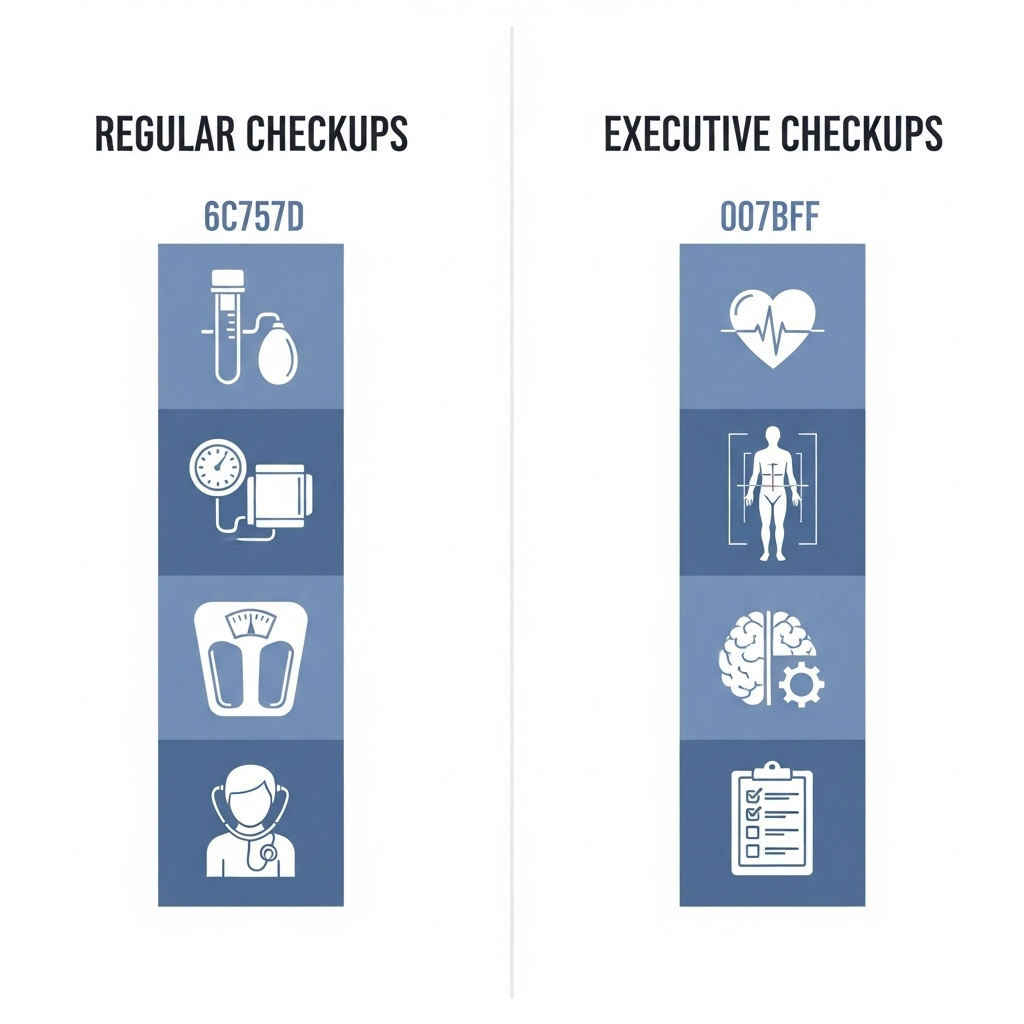Executive health checkups help keep business leaders healthy. When top managers stay well, their whole company works better. A sick leader affects everyone's work and mood.indushealthplus+1
At Dr. Morepen Home, we know that good health starts with regular checkups. This guide shows why executive health screenings matter for your business.
What Are Executive Health Checkups?
Executive health checkups are detailed medical tests made for busy leaders. They're different from regular doctor visits. These checkups look deeper into your health.drmorepenhome+1
Regular checkups might miss early warning signs. Executive screenings catch problems before they get serious. They check your heart, brain, lungs, and more in one visit.worldclinic+1
Why Executives Need Special Health Care
Business leaders face unique health risks. Long work hours stress the body. Travel disrupts sleep patterns. Pressure affects mental health.indushealthplus+1
Companies that invest in executive health see real benefits:indushealthplus+1
- Leaders catch health problems early
- Stress gets managed better
- Work performance improves
%20(1).png)
How Executive Checkups Differ from Regular Ones
Standard doctor visits focus on basic tests. Executive checkups go much further. Here's what makes them special:magazine.medicaltourism
Regular Checkups Include:
- Basic blood tests
- Blood pressure checks
- Weight measurement
- Simple physical exam

Executive Checkups Add:
- Advanced heart screeningsmagazine.medicaltourism
- Full body scans
- Detailed blood work
- Stress level testing
- Mental health supportdrmorepenhome
- Nutrition counseling
What's Inside an Executive Health Checkup
Executive health packages include many different tests. Each test serves a specific purpose.worldclinic+1
Standard Tests You'll Get
Most executive checkups include these basic screenings:
Blood Work
- Cholesterol levels
- Blood sugar tests
- Liver function
- Kidney health markers
Heart Health
- ECG readings
- Blood pressure monitoring
- Advanced lipid profilesmagazine.medicaltourism

Body Scans
- X-rays for bone health
- Ultrasounds for organs
- MRI scans when neededmagazine.medicaltourism
Senses Check
- Vision testing
- Hearing evaluation
Custom Options for Your Company
Every business has different health needs. Some companies face more stress. Others have older workers. Smart health programs adjust to fit your team.advantageclub+2
Custom options might include:
- Stress management trainingadvantageclub
- Special diets for health conditions
- Mental wellness workshopsadvantageclub
- Sleep disorder testing
Special Tests for High-Risk Leaders
Some executives need extra attention. Family history matters. Job stress levels vary. Past health problems require monitoring.worldclinic
High-risk screenings include:
- Cancer marker testsmagazine.medicaltourism
- Genetic testing for inherited diseases
- Sleep studies for tired executives
- Advanced heart stress testsmagazine.medicaltourism
Benefits of Corporate Health Programs
Healthy employees work better. Companies see real returns on health investments. The numbers prove wellness programs work.indushealthplus+1
Better Employee Health and Work Output
When workers feel cared for, they perform better. Health checkups show employees their value to the company. This builds loyalty and motivation.nashcares+2
Healthy teams mean:
- Fewer sick daysindushealthplus+1
- Higher work quality
- Better team morale
- Lower stress levelsindushealthplus
Money Saved on Healthcare
Prevention costs less than treatment. Early detection stops small problems from becoming expensive ones. Companies report significant healthcare savings.worldclinic+2 But they prevent much larger medical bills later.worldclinic
.png)
Starting Your Corporate Wellness Program
Building a wellness program takes planning. Success requires support from company leaders. Follow these steps to get started.vantagefit+1
Step One: Learn What Your Team Needs
Survey your employees first. Ask about their health concerns. Find out what wellness activities interest them most.vantagefit+1
Use anonymous surveys to get honest answers. Focus groups help too. Listen to what people really want.advantageclub
Step Two: Set Clear Goals
Define what success looks like. Do you want fewer sick days? Lower insurance costs? Happier employees?vantagefit+1
Good goals are specific and measurable. Track participation rates. Monitor health improvements. Count cost savings.advantageclub
Step Three: Get Leadership Support
Company leaders must support the program. Show them the business benefits. Explain how wellness improves productivity and reduces costs.vantagefit+1
Leaders should participate themselves. When the boss joins wellness activities, others follow.nashcares
Step Four: Create Your Wellness Plan
Design a program that fits your company culture. Include different types of wellness:advantageclub
Physical Health
- Gym memberships
- Fitness challenges
- On-site health screeningsadvantageclub
Mental Wellness
- Counseling services
- Stress management classes
- Mindfulness trainingadvantageclub
Social Connection
- Team building events
- Group volunteer work
- Company social activitiesadvantageclub
Step Five: Tell Everyone About It
Use multiple ways to spread the word. Send emails. Post flyers. Talk about it in meetings. Share success stories to build excitement.advantageclub
Clear communication builds trust. Answer questions openly. Address any concerns people might have.
Step Six: Track Your Results
Measure program success regularly. Look at participation numbers. Check health outcome improvements. Calculate return on investment.vantagefit+1
Use this data to improve your program. What works well? What needs changes? Keep updating based on feedback.advantageclub
Picking the Right Health Program
Many companies offer corporate health services. Choosing the right one matters for program success. Consider these factors when deciding.
Checking Out Providers
Look for experienced healthcare companies. Dr. Morepen brings years of health screening expertise. Check their reputation with other businesses.worldclinic
Ask about customization options. Your company has unique needs. The provider should adapt their services to fit.indushealthplus+1
How Often Should Checkups Happen
Different employees need different screening schedules:
Most Employees: Annual checkups work well for healthy workers under 50.
High-Risk Groups: Executives with health concerns might need checkups twice yearly.worldclinic
Special Programs: Quarterly wellness days can boost health awareness throughout the year.
Understanding Insurance Coverage
Know what your company insurance covers. This affects program costs and employee participation.worldclinic
Work with providers who accept your insurance. Pre-negotiated rates help control expenses. Educate employees about their coverage benefits.worldclinic
Making Health a Priority
Your heart health affects everything else in your life. Good cardiovascular habits prevent disease and improve daily energy. Small changes make big differences over time.
Heart-healthy habits include eating well, exercising regularly, and managing stress. These simple steps build a foundation for lifelong wellness.
At Dr. Morepen Home, we support your health journey. We provide resources and expert guidance to help you succeed. Starting today leads to a healthier tomorrow.
FAQ
When should I start focusing on heart health?
Start healthy habits early. Your 30s are crucial for preventing age-related heart problems. But it's never too late to begin.
How often do I need heart checkups?
Most adults need basic heart screening every two years. People with risk factors may need annual tests. Discuss your specific needs with your doctor.worldclinic
Do lifestyle changes really help?
Yes. Diet, exercise, and stress management dramatically reduce heart disease risk. These changes improve overall health and energy levels too.
What daily habits support heart health?
Take stairs instead of elevators. Walk during work breaks. Practice stress-reducing activities. Eat more fruits, vegetables, and whole grains.
Does family history matter for heart disease?
Family history does increase your risk. If heart disease runs in your family, be extra careful about healthy habits. Regular screenings become even more important.Stay informed about your health. Use resources like Dr. Morepen Home to make smart wellness choices. Your future self will thank you for starting today.
.png)



.png)
.png)
.png)
.png)
.png)
.png)
.png)

.png)
.png)
.png)

.png)
.png)
.png)
.png)
.png)
.png)

.png)
.png)

.png)
.png)
.png)

.png)

.png)


.png)







